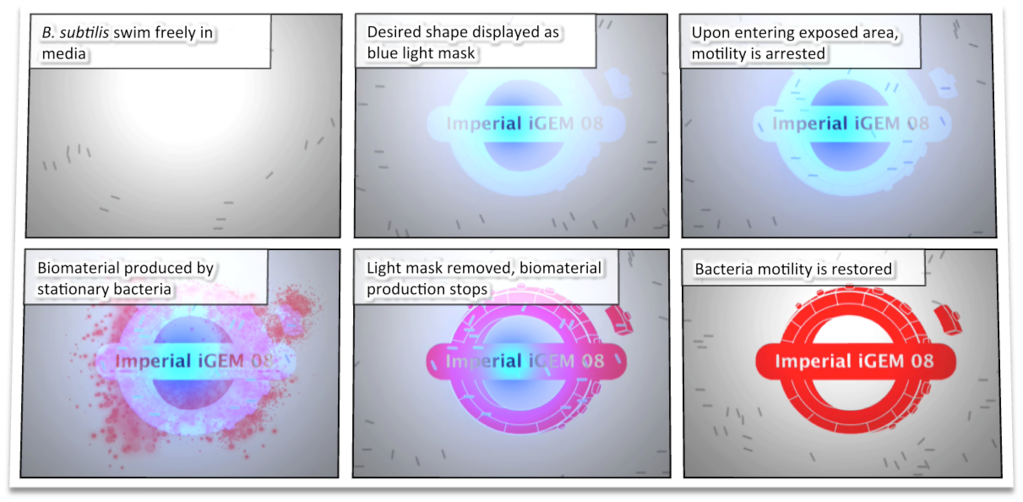Team:Imperial College
From 2008.igem.org
(Difference between revisions)
m |
m |
||
| Line 4: | Line 4: | ||
{{Imperial/Box1|| | {{Imperial/Box1|| | ||
<html><center><img width="700px" src="https://static.igem.org/mediawiki/2008/9/94/Imperial_2008_Title.png"></center> | <html><center><img width="700px" src="https://static.igem.org/mediawiki/2008/9/94/Imperial_2008_Title.png"></center> | ||
| - | <font size="4pt"></html><center>'''For the 2008 iGEM competition, the Imperial College Team aims to develop a genetically-engineered Biofabricator, using the Gram-positive bacterium Bacillus subtilis as our chassis. Our Biofabricator aims to produce self-assembling biomaterials in specified 3D shapes, using light as the trigger.'''<html></font><br><br>< | + | <font size="4pt"></html><center>'''For the 2008 iGEM competition, the Imperial College Team aims to develop a genetically-engineered Biofabricator, using the Gram-positive bacterium Bacillus subtilis as our chassis. Our Biofabricator aims to produce self-assembling biomaterials in specified 3D shapes, using light as the trigger.'''<html></font><br><br><i>Pushed for time? <b><a href="https://2008.igem.org/Team:Imperial_College/Summary">Summer Summary</a></b></i><img style="vertical-align:baseline;" width="350px" src="http://i59.photobucket.com/albums/g305/Timpski/Logo1.png"><i>Example Application: <b><a href="https://2008.igem.org/Team:Imperial_College/Biocouture">Biocouture</a></b></i></center> |
| - | + | <br></html> | |
|}} | |}} | ||
| Line 15: | Line 15: | ||
<html><center><img width="800px" src="http://i59.photobucket.com/albums/g305/Timpski/Comic_No_Title.png"></center></html> | <html><center><img width="800px" src="http://i59.photobucket.com/albums/g305/Timpski/Comic_No_Title.png"></center></html> | ||
<br> | <br> | ||
| - | + | '''<html><center><font size=4px></html>Please continue on to our project pages - you may want to start with our [[Team:Imperial_College/Project/ |>>> Project Specifications >>>''']]<html></font></center></html> | |
<br> | <br> | ||
}} | }} | ||
| Line 29: | Line 29: | ||
</td><td><ul id="sddm"><a href="#">Back to top</a></ul> | </td><td><ul id="sddm"><a href="#">Back to top</a></ul> | ||
</td><td><ul id="sddm"></html>[[Team:Imperial_College/Project |Next >]]<html></ul> | </td><td><ul id="sddm"></html>[[Team:Imperial_College/Project |Next >]]<html></ul> | ||
| - | </td></tr></table> | + | </td></tr></table></center></div></td></tr></table></html> |
| - | </center> | + | |
| - | </div></td></tr></table> | + | |
Revision as of 17:25, 24 October 2008
| |||||||||||||||
 "
"


 Example Application:
Example Application: 



